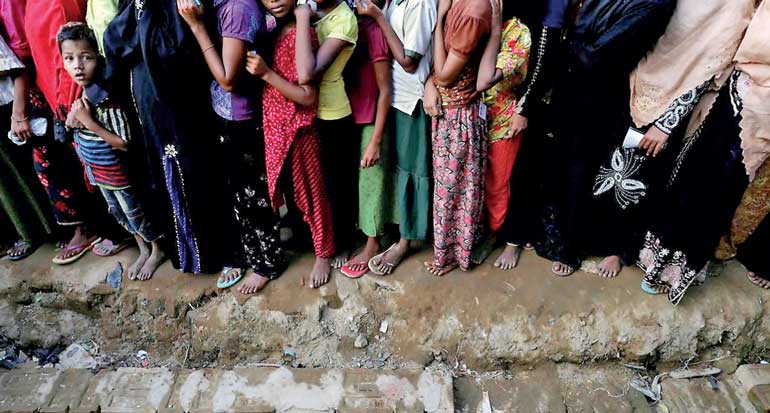Wednesday Feb 18, 2026
Wednesday Feb 18, 2026
Friday, 24 November 2017 00:00 - - {{hitsCtrl.values.hits}}
 Washington (Reuters): The United States on Wednesday called the Myanmar military operation against the Rohingya population “ethnic cleansing” and threatened targeted sanctions against those responsible for what it described as “horrendous atrocities.”
Washington (Reuters): The United States on Wednesday called the Myanmar military operation against the Rohingya population “ethnic cleansing” and threatened targeted sanctions against those responsible for what it described as “horrendous atrocities.”
“The situation in northern Rakhine state constitutes ethnic cleansing against the Rohingya,” U.S. Secretary of State Rex Tillerson said in a statement, using a term he avoided when visiting Myanmar, also known as Burma, last week.
“The United States will also pursue accountability through U.S. law, including possible targeted sanctions” against those responsible for the alleged abuses, which have driven hundreds of thousands of Rohingya into neighboring Bangladesh, he said.
The United States shifted its stance in part to raise pressure on Myanmar’s military and civilian leaders, who have shared power for the past two years under an uneasy arrangement after decades of military rule, to address the crisis.
Rights monitors accused Myanmar’s military of atrocities, including killings, mass rape and arson, against the stateless Rohingya during so-called clearance operations after Rohingya militants’ Aug. 25 attacks on 30 police posts and an army base.
More than 600,000 Rohingya Muslims have fled Rakhine state in Buddhist-majority Myanmar, mostly to neighboring Bangladesh, since the crackdown, which followed the insurgent attacks.
“These abuses by some among the Burmese military, security forces, and local vigilantes have caused tremendous suffering and forced hundreds of thousands of men, women, and children to flee their homes,” Tillerson said.
While repeating U.S. condemnation of the insurgent attacks, he added: “No provocation can justify the horrendous atrocities that have ensued.”
Myanmar’s 2-year-old government, led by Nobel Peace Prize laureate Aung San Suu Kyi, has faced heavy international criticism for its response to the crisis, though it has no control over the generals with whom it shares power.
“It’s not a situation that is completely under her authority, but certainly we are counting on her to show leadership and also to work through the civilian government with the military to address the crisis,” a senior U.S. official told reporters in a conference call.
The term “ethnic cleansing” is not defined in international or U.S. law and does not inherently carry specific consequences, a second senior U.S. official said on the call.
Mladic convicted
The U.S. move came the same day that a U.N. tribunal convicted former Bosnian Serb military commander Ratko Mladic of genocide and crimes against humanity for massacres of Bosnian Muslims and ethnic cleansing campaigns, and imprisoned him for life.
The second U.S. official said Washington was analysing whether genocide or crimes against humanity had occurred in Myanmar, which would violate international law, but has made no determination on either and that this would take time to assess.
“In the end it’s a court that has to decide that, as we’ve just seen with the verdict against Mladic,” he said.
A top U.N. official in September described the military actions as a textbook case of “ethnic cleansing,” but the United States until Wednesday had avoided the term.
Washington has sought to balance its wish to nurture the civilian government in Myanmar, where it competes for influence with China, with its desire to hold the military accountable for the abuses. U.S. officials also worry that the mistreatment of the Rohingya Muslim minority may fuel radicalism.
The first U.S. official said Washington would work with Bangladesh and Myanmar to encourage the voluntary repatriation of Rohingya.
“We have focused on the issue of voluntary returns,” the official said. “We don’t want people to be forced to return to a situation in which they feel uncomfortable.”
Congressional pressure for a tougher U.S. response to the Rohingya crisis mounted before President Donald Trump’s first visit to Asia this month to attend a summit of Southeast Asian countries, including Myanmar, in Manila.
U.S. government sources told Reuters in October that officials were preparing a recommendation for Tillerson that would define the military-led campaign against the Rohingya as ethnic cleansing, which could spur new sanctions.
In early November, U.S. lawmakers proposed targeted sanctions and travel restrictions on Myanmar military officials.
The U.S.-based advocacy organisation Refugees International hailed Tillerson’s assessment of ethnic cleansing, but said it was essential that sanctions be imposed on key military leaders, including the army chief, Senior General Min Aung Hlaing.
Rights group Amnesty International called for a comprehensive arms embargo against Myanmar as well as targeted financial sanctions against senior Myanmar military officials.
 Naypyitaw (Reuters): Myanmar and Bangladesh signed an accord on Thursday over terms for the return of hundreds of thousands of Rohingya Muslims who have fled to Bangladesh, a government official said, amid concern that Myanmar’s powerful army could prove obstructive.
Naypyitaw (Reuters): Myanmar and Bangladesh signed an accord on Thursday over terms for the return of hundreds of thousands of Rohingya Muslims who have fled to Bangladesh, a government official said, amid concern that Myanmar’s powerful army could prove obstructive.
Rights groups have accused the military in mostly Buddhist Myanmar of carrying out mass rape and other atrocities during a counter-insurgency operation launched in late August in retaliation for attacks by Rohingya militants in Rakhine State.
On Wednesday, the United States said the military operation that drove 620,000 Rohingya to seek sanctuary in neighbouring, largely Muslim Bangladesh, amounted to “ethnic cleansing”, echoing an accusation first levelled by top U.N. officials in the early days of the humanitarian crisis.
Myanmar is seeking to ease international pressure by striking an initial agreement on returns, while Dhaka wants to ensure overstretched refugee camps that have mushroomed in the Cox’s Bazar region don’t become permanent.
“We are ready to take them back as soon as possible after Bangladesh sends the forms back to us,” Myint Kyaing, a permanent secretary at Myanmar’s ministry of labour, immigration and population, told Reuters, referring to forms the Rohingya must complete with personal details before repatriation. The signing took place after a meeting between Myanmar’s civilian leader Aung San Suu Kyi and Bangladesh foreign minister Abul Hassan Mahmood Ali in Naypyitaw.
Myint Kyaing said that the memorandum of understanding was based on the 1992-1993 repatriation agreement between the two countries which had been inked following a previous spasm of violence in Myanmar.
The forms that the refugees will have to fill include names of family members, their previous address in Myanmar, date of birth and a disclaimer that they are returning voluntarily, said Myint Kyaing.
He said that based on the 1992-1993 agreement, Myanmar would accept those who could present identification documents issued to the Rohingya by Myanmar governments in the past. Those include the currently distributed national verification cards, as well as now-withdrawn “white cards”, as well a s receipts the Rohingya received when returning their “white cards”, he said.
Speaking at a military event in Dhaka, Bangladesh Prime Minister Sheikh Hasina said she was calling on Myanmar ”to start taking back soon their nationals from Bangladesh.”
Suu Kyi, whose reputation as a Nobel peace prize winner has suffered during the crisis, has said repatriation of the largely stateless Muslim minority would be based on residency and that it will be “safe and voluntary”.
But her less than two-year-old civilian administration has to share power with the military who ruled the country for decades, and Myanmar’s generals have appeared less enthusiastic about the prospect of Rohingya returning.